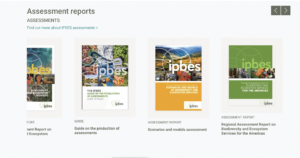Ghana constitutes intergovernmental science policy platform on biodiversity and ecosystem services
 Ghana has constituted a 44-member national level experts to support the work of the Intergovernmental Science Policy Platform on Biodiversity and Ecosystem Services (IPBES).
Ghana has constituted a 44-member national level experts to support the work of the Intergovernmental Science Policy Platform on Biodiversity and Ecosystem Services (IPBES).
IPBES, is an independent intergovernmental body that assesses the state of the planet’s biodiversity, its ecosystems and the essential services.
Its periodic reports inform policy decisions at the local, national and international levels.
Dr Henry K. Kokofu, the Executive Director of the Environmental Protection Agency who outdoored the local platform members in Accra charged them to increase the visibility of IPBES reports.
The local platform members drawn from state and non-state actors working in the nature protection space would also leverage IPBES processes to undertake similar national assessments.
He said since 2012, IPBES had produced 10 different reports that had provided knowledge, and the scientific evidence and policy options to address the threats of biodiversity loss.
Professor Christopher Gordon, a member of IPBES’s Multidisciplinary Expert Panel said recent reports indicated that human management of natural resources was pushing the environment to a tipping point, creating an effect that may affect sustainability and security.
He said the rate at which natural resources were being exploited was leading to a dramatic ecological change that may be difficult to reverse, considering the growing sense of urgency surrounding the issue of global climate change.
Prof. Gordon urged the platform members to build a stronger synergy with all stakeholders to identify the gaps in the sector and recommend solutions.
“One of the challenges is lack of data. More research needs to be conducted,” he said.
Mrs Jewel Kudjawu, the National IPBES Focal Person said the Global Assessment Report on Biodiversity and Ecosystem Services published in 2019 made staggering revelations that 75 per cent of the Earth’s land surface was significantly altered.
It also revealed that 66 per cent of the ocean area was experiencing increasing cumulative impacts, and over 85 per cent of wetland areas have been lost mainly due to human activities.
She said that assessment report formed the basis for the framing of the Post 2020 Kunming – Montreal Global Biodiversity Framework.
Mrs Kudjawu said the recent report by IPBES on Invasive Alien Species and their control showed that more than 37,000 alien species were introduced by many human activities to regions and biomes around the world.
More than 3,500 of these are harmful invasive alien species-seriously threatening nature, nature’s contributions to people and excellent quality of life.
The loss of biodiversity had untold consequences for humanity adding that “by destroying nature, we are undermining the fundamental bedrock that enables our health and well-being, our clean water and air, our food and medicine supply, our economic prosperity and social progress and indeed, our very survival here on Earth”.
Source: GNA
